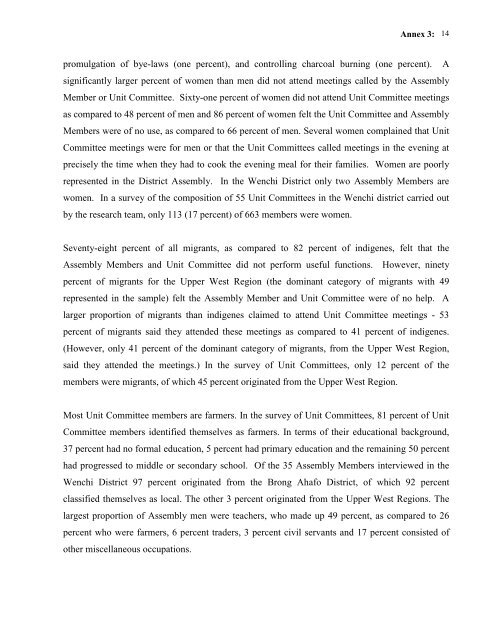Poverty Dimensions of Public Governance and Forest Management ...
Poverty Dimensions of Public Governance and Forest Management ...
Poverty Dimensions of Public Governance and Forest Management ...
You also want an ePaper? Increase the reach of your titles
YUMPU automatically turns print PDFs into web optimized ePapers that Google loves.
Annex 3: 14<br />
promulgation <strong>of</strong> bye-laws (one percent), <strong>and</strong> controlling charcoal burning (one percent). A<br />
significantly larger percent <strong>of</strong> women than men did not attend meetings called by the Assembly<br />
Member or Unit Committee. Sixty-one percent <strong>of</strong> women did not attend Unit Committee meetings<br />
as compared to 48 percent <strong>of</strong> men <strong>and</strong> 86 percent <strong>of</strong> women felt the Unit Committee <strong>and</strong> Assembly<br />
Members were <strong>of</strong> no use, as compared to 66 percent <strong>of</strong> men. Several women complained that Unit<br />
Committee meetings were for men or that the Unit Committees called meetings in the evening at<br />
precisely the time when they had to cook the evening meal for their families. Women are poorly<br />
represented in the District Assembly. In the Wenchi District only two Assembly Members are<br />
women. In a survey <strong>of</strong> the composition <strong>of</strong> 55 Unit Committees in the Wenchi district carried out<br />
by the research team, only 113 (17 percent) <strong>of</strong> 663 members were women.<br />
Seventy-eight percent <strong>of</strong> all migrants, as compared to 82 percent <strong>of</strong> indigenes, felt that the<br />
Assembly Members <strong>and</strong> Unit Committee did not perform useful functions. However, ninety<br />
percent <strong>of</strong> migrants for the Upper West Region (the dominant category <strong>of</strong> migrants with 49<br />
represented in the sample) felt the Assembly Member <strong>and</strong> Unit Committee were <strong>of</strong> no help. A<br />
larger proportion <strong>of</strong> migrants than indigenes claimed to attend Unit Committee meetings - 53<br />
percent <strong>of</strong> migrants said they attended these meetings as compared to 41 percent <strong>of</strong> indigenes.<br />
(However, only 41 percent <strong>of</strong> the dominant category <strong>of</strong> migrants, from the Upper West Region,<br />
said they attended the meetings.) In the survey <strong>of</strong> Unit Committees, only 12 percent <strong>of</strong> the<br />
members were migrants, <strong>of</strong> which 45 percent originated from the Upper West Region.<br />
Most Unit Committee members are farmers. In the survey <strong>of</strong> Unit Committees, 81 percent <strong>of</strong> Unit<br />
Committee members identified themselves as farmers. In terms <strong>of</strong> their educational background,<br />
37 percent had no formal education, 5 percent had primary education <strong>and</strong> the remaining 50 percent<br />
had progressed to middle or secondary school. Of the 35 Assembly Members interviewed in the<br />
Wenchi District 97 percent originated from the Brong Ahafo District, <strong>of</strong> which 92 percent<br />
classified themselves as local. The other 3 percent originated from the Upper West Regions. The<br />
largest proportion <strong>of</strong> Assembly men were teachers, who made up 49 percent, as compared to 26<br />
percent who were farmers, 6 percent traders, 3 percent civil servants <strong>and</strong> 17 percent consisted <strong>of</strong><br />
other miscellaneous occupations.
















